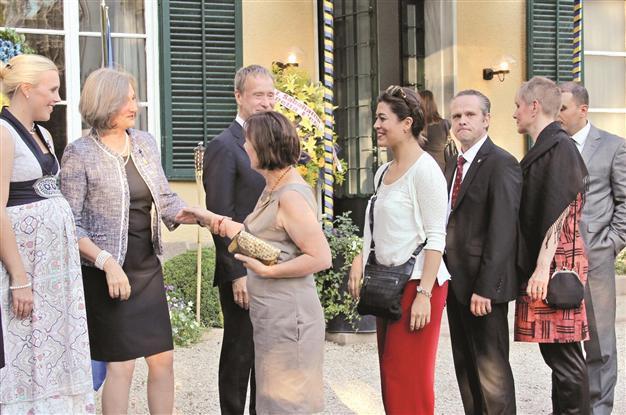Why are fewer Turks attending diplomatic receptions?
ANKARA - Hürriyet Daily News

The Swedish national day reception is one of the social events at which less and less Turkish participation is being observed. AA photo
In a city like Ankara, a regular capital city, where the social life is far from offering a rich variety of options, receptions held by prominent embassies in their beautiful gardens mean a lot. Not only, of course, for the free booze and socializing, but also for networking with bureaucrats, diplomats and other high-level officials from both the government and embassies.But the trend is changing. These receptions have started to turn into foreigner-to-foreigner social events in recent years, with less and less Turkish participation being observed. Government members, foreign ministry officials, and military bureaucracy now rarely appear at receptions (especially those of European countries). But it's not only them, even the number of journalists attending seems in constant decline.
UK ambassador alone at the podium
This observation proved itself last week when British Ambassador David Reddaway stood alone at the podium for his welcoming speech on the occasion of Queen Elizabeth II’s birthday. Under normal conditions, a Cabinet minister should have joined Reddaway in welcoming the participants and to say a few words hailing bilateral relations. EU Minister Egemen Bağış was in Istanbul that day and sent his apology to the ambassador. Instead, number three of the EU Ministry, undersecretary Haluk Ilıcak, attended the reception, marking the highest representation from the Turkish government. Not a single diplomat from the Turkish Foreign Ministry was seen by journalists, either. The same was applicable for the Swedish national day reception a few days before the British one.
As for non-European countries’ receptions, the procedure is a little bit flexible. For the upcoming Russian and American receptions, on June 12 and July 4 respectively, one Cabinet minister is expected to attend with some other senior foreign ministry officials, even undersecretaries if not the undersecretary himself, depending on their availability. Islamic countries’ receptions may vary to host one or two ministers at the same time and with satisfactory representation from the ruling party. In the past, however, even some top advisers of the prime minister and representatives from the ruling party’s foreign desk were observable.
The Nationalist Movement Party (MHP) has always been completely non-existent, while the Republican People’s Party (CHP) sometimes sends a few of its lawmakers to such events.
Another interesting observation is the fact that there are only a few diplomatic correspondents and Ankara bureau chiefs who are still hanging out at these receptions. Decisions to attend such events are purely personal for many of the invitees, but in a world where reciprocity is the most standing criteria, the officials’ boycotting national day receptions of other countries will only cause more empty halls of Turkish embassies across the world on our Oct. 29 Republic Day celebrations.
















